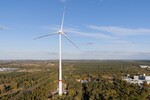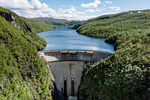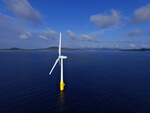04/22/2012
Georgia - High wind energy potential in former Sowjet state
This energy could be used locally as well as being exported, aiming to reduce greenhouse gas emissions in the atmosphere. “Georgia is quite rich in terms of renewable energies including hydro and wind energies,” Archil Zedginidze, Director of Karenegro, told The FINANCIAL. “We conducted a feasibility study of the whole of Georgia and found out that the richest regions in term of wind energy are: the gorge of the river Chorokhi, Paravani lake, Likhi mountain range, Mukhrani field, outskirts of Kutaisi and West-Eastern part of Tbilisi , also the outskirts of Rustavi and areas between Khashuri and Gori. We have all the materials needed to start building wind turbines there but interest in it isn’t high enough.”
“We had several business negotiations with American and Japanese investors, but in the end they were rejected. In my opinion the legislation has to be changed and suited to the needs of potential investors in this field. At least they need a guarantee that wind energy would be purchased and the price also has to be defined beforehand. So attractive legislation and tariffs are essential,” Zedginidze explained.
The Ministry of Energy of Georgia has some negotiations with Turkish and Norwegian investors to implement projects at Paravani Lake and Skra. But they still consider hydro energy more of a priority than wind energy because of the price difference and experience which has built up in the hydro energy sector in Georgia.
“We can’t subsidy wind energy as we have a lot more important problems,” said Mariam Valishvili, First Deputy of the Minister of Energy. “The cost of building one megawatt wind firm is 1 million EUR, which is quite costly. This will increase the net price of energy and according to our calculations the net price of one KWh of energy is 16 cents. At the same time the areas with good wind energy potential are places where infrastructure isn’t developed at all. Constructing roads and transmission lines would take up almost half of the budget. For those reasons it isn’t worth starting and therefore we prefer to build hydro energy stations.”
Currently the net price of energy made by old hydropower stations is 5 tetri. The price of new stations is 7 cents, which is 2-3 times more than the old stations. But the building of new hydro energy stations is scheduled so that it won’t affect the price that the Georgian population pay for energy. According to international practice, money invested in wind electric power could be seen back after ten years. Only after this would wind energy become cheaper.
“There is currently only one wind turbine in the village Skra. The project was funded by USAID. The prime cost of the turbine is about 25,000 USD. It produces only 22,000 KWh energy per year, which is enough for two families,” Valishvili said.
“This was a pilot project and we are always open to such projects. But I think that Georgia is still far from the day when it will have plenty of wind firm,” Valishvili said.
One Georgian businessman asked Karenergo to conduct a feasibility study near Mtskheta. He wanted to build a restaurant running on wind energy. The price of a feasibility study is up to one percent of the price of a wind firm however.
“They wanted to build a 20 megawatt wind firm,” Zedginidze said. “Its price is about 22 million EUR. The feasibility study costs about 300,000-400,000 EUR. But in the end they didn’t build the station because of the high cost. On the other hand wind energy isn’t stable and it needs to be balanced with other energy sources.”
In spite of the problems, Zedginidze thinks that it would be reasonable to start the building of at least one wind firm. This won’t affect the price.
Importance of renewable energies -- Increasing consumption of renewable energies is considered one of the best ways to solve problems caused by climate change. Climate change was detected in the second half of the 18th century and has been growing since then.
“Global warming is a global problem and can’t be solved locally,” said Grigol Lazrievi, Head of the Hydrogeology and Climate Change Division at the Ministry of Environment Protection. “About 90 percent of energy consumed in Georgia is renewable, but this is only 12-15 percent of the overall potential of Georgia. The country has to start intensive works to get more renewable energy and export abroad. We don’t currently appreciate the real danger of global warming. But if we don’t reduce emissions in the atmosphere, the situation will become dramatic. Renewable energies including wind energy can play a crucial role in this.”
Georgia is responsible for only 0.03 percent of the whole emissions in the atmosphere. If we reduce emissions locally, it will have an ideal effect on air pollution locally. The country will benefit from this significantly. But it can’t change the general situation of climate change if the entire world doesn’t start reducing emissions too.
“The affect of global warming in Georgia is evident in the country’s seaside regions, as the level of water is risen,” Lazrievi explained. “The situation is worse in Batumi and Anaklia. At the same time natural disasters have increased so significantly in strength and frequency. High, mountainous regions have the most difficulty, as rivers are too fast because of the relief and have devastating power. For that reason the development of renewable energies is vital.”
For more information on this article or if you would like to know more about what www.windfair.net can offer, please do not hesitate to contact Trevor Sievert at ts@windfair.net
www.windfair.net is the largest international B2B Internet platform – ultimately designed for connecting wind energy enthusiasts and companies across the globe!
“We had several business negotiations with American and Japanese investors, but in the end they were rejected. In my opinion the legislation has to be changed and suited to the needs of potential investors in this field. At least they need a guarantee that wind energy would be purchased and the price also has to be defined beforehand. So attractive legislation and tariffs are essential,” Zedginidze explained.
The Ministry of Energy of Georgia has some negotiations with Turkish and Norwegian investors to implement projects at Paravani Lake and Skra. But they still consider hydro energy more of a priority than wind energy because of the price difference and experience which has built up in the hydro energy sector in Georgia.
“We can’t subsidy wind energy as we have a lot more important problems,” said Mariam Valishvili, First Deputy of the Minister of Energy. “The cost of building one megawatt wind firm is 1 million EUR, which is quite costly. This will increase the net price of energy and according to our calculations the net price of one KWh of energy is 16 cents. At the same time the areas with good wind energy potential are places where infrastructure isn’t developed at all. Constructing roads and transmission lines would take up almost half of the budget. For those reasons it isn’t worth starting and therefore we prefer to build hydro energy stations.”
Currently the net price of energy made by old hydropower stations is 5 tetri. The price of new stations is 7 cents, which is 2-3 times more than the old stations. But the building of new hydro energy stations is scheduled so that it won’t affect the price that the Georgian population pay for energy. According to international practice, money invested in wind electric power could be seen back after ten years. Only after this would wind energy become cheaper.
“There is currently only one wind turbine in the village Skra. The project was funded by USAID. The prime cost of the turbine is about 25,000 USD. It produces only 22,000 KWh energy per year, which is enough for two families,” Valishvili said.
“This was a pilot project and we are always open to such projects. But I think that Georgia is still far from the day when it will have plenty of wind firm,” Valishvili said.
One Georgian businessman asked Karenergo to conduct a feasibility study near Mtskheta. He wanted to build a restaurant running on wind energy. The price of a feasibility study is up to one percent of the price of a wind firm however.
“They wanted to build a 20 megawatt wind firm,” Zedginidze said. “Its price is about 22 million EUR. The feasibility study costs about 300,000-400,000 EUR. But in the end they didn’t build the station because of the high cost. On the other hand wind energy isn’t stable and it needs to be balanced with other energy sources.”
In spite of the problems, Zedginidze thinks that it would be reasonable to start the building of at least one wind firm. This won’t affect the price.
Importance of renewable energies -- Increasing consumption of renewable energies is considered one of the best ways to solve problems caused by climate change. Climate change was detected in the second half of the 18th century and has been growing since then.
“Global warming is a global problem and can’t be solved locally,” said Grigol Lazrievi, Head of the Hydrogeology and Climate Change Division at the Ministry of Environment Protection. “About 90 percent of energy consumed in Georgia is renewable, but this is only 12-15 percent of the overall potential of Georgia. The country has to start intensive works to get more renewable energy and export abroad. We don’t currently appreciate the real danger of global warming. But if we don’t reduce emissions in the atmosphere, the situation will become dramatic. Renewable energies including wind energy can play a crucial role in this.”
Georgia is responsible for only 0.03 percent of the whole emissions in the atmosphere. If we reduce emissions locally, it will have an ideal effect on air pollution locally. The country will benefit from this significantly. But it can’t change the general situation of climate change if the entire world doesn’t start reducing emissions too.
“The affect of global warming in Georgia is evident in the country’s seaside regions, as the level of water is risen,” Lazrievi explained. “The situation is worse in Batumi and Anaklia. At the same time natural disasters have increased so significantly in strength and frequency. High, mountainous regions have the most difficulty, as rivers are too fast because of the relief and have devastating power. For that reason the development of renewable energies is vital.”
For more information on this article or if you would like to know more about what www.windfair.net can offer, please do not hesitate to contact Trevor Sievert at ts@windfair.net
www.windfair.net is the largest international B2B Internet platform – ultimately designed for connecting wind energy enthusiasts and companies across the globe!
- Source:
- Online Editorial www.windfair.net
- Author:
- Posted by Trevor Sievert, Online Editorial Journalist
- Email:
- ts@windfair.net
- Link:
- www.windfair.net/...
- Keywords:
- wind, wind energy, wind turbine, rotorblade, awea, ewea, wind power, suppliers, manufacturerstrevor sievert
























